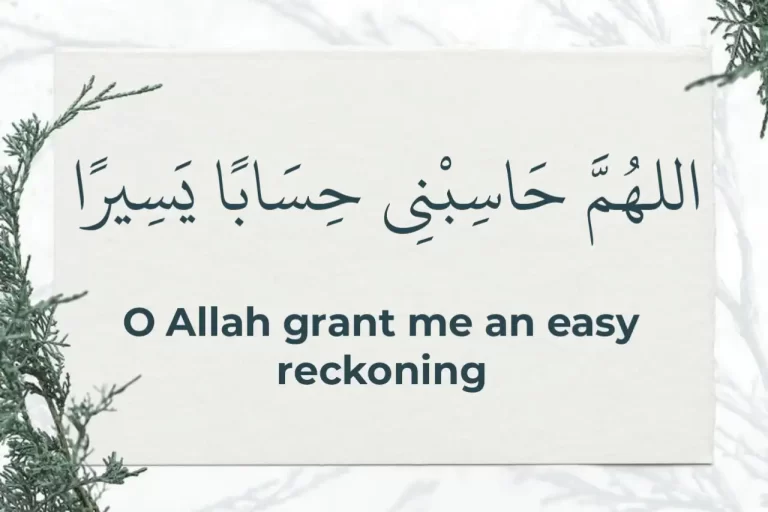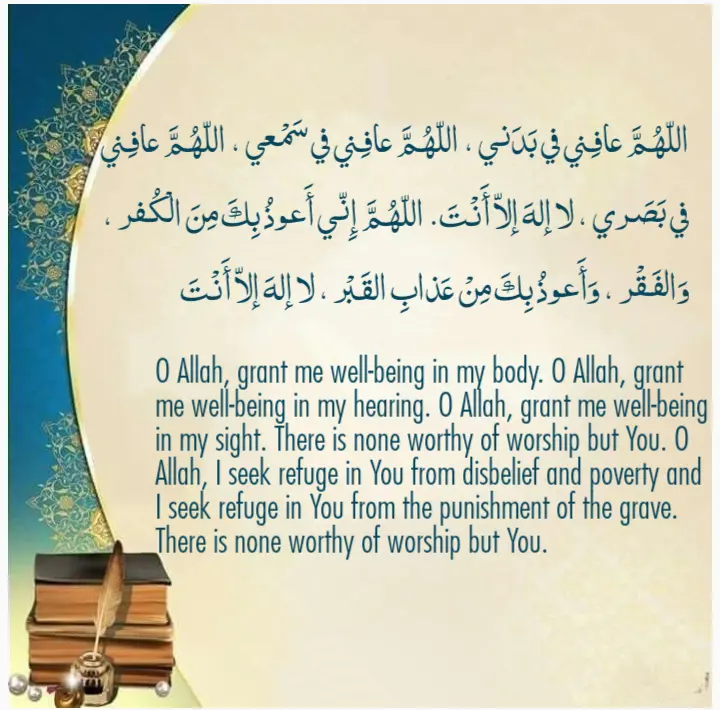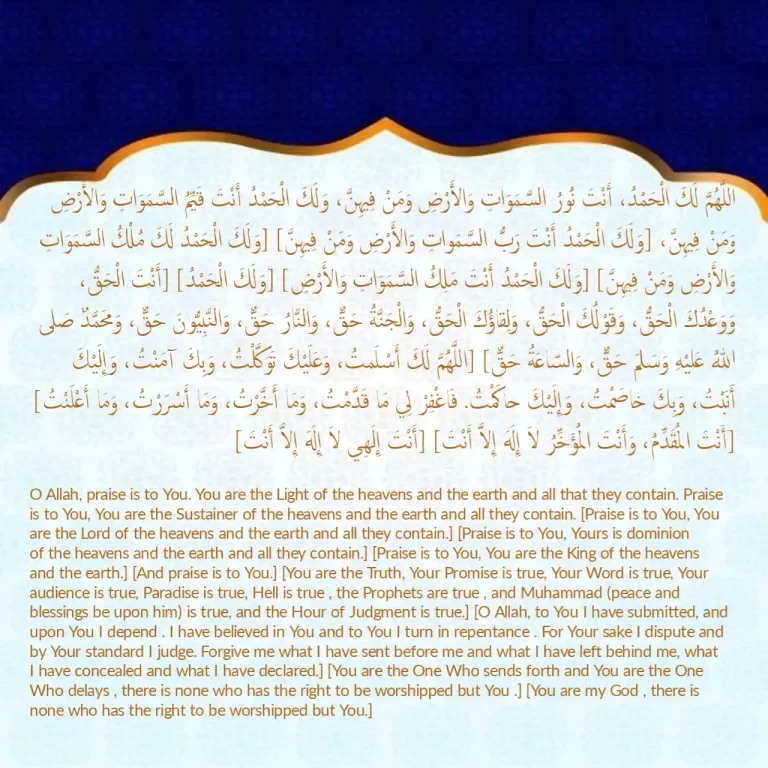Allahumma Maghfir Lee Zambi Kullahu Dua Arabic Text & Meaning
Advertisements
Allahumma Maghfir Lee Zambi Kullahu is a beautiful and comprehensive supplication that we can make while in sujood (prostration) during our prayers. In sujood, we are at our most humble and closest to Allah, which makes it an ideal moment for seeking forgiveness and turning to Him with sincerity. Here’s a deeper look into the dua, what it means, and why it’s so impactful for a believer.
Allahumma Maghfir Lee Zambi Kullah in Arabic Text
The dua is written in Arabic as:
اللَّهُمَّ اغْفِرْ لِي ذَنْبِي كُلَّهُ، دِقَّهُ وَجِلَّهُ ، وَأَوَّلَهُ وَآخِرَهُ، وَعَلَانِيَتَهُ وَسِرَّهُ
Transliteration
The dua is transliterated as Allahum-maghfir li dhanbi kullahu: diqqahu wa jillahu, wa ‘awwalahu wa akhirahu, wa alaniyatahu wa sirrahu.
Allahumma Maghfir Lee Zambi Kullahu Meaning in English
Allahumma maghfir lee zanbee means O Allah! Forgive me all my sins, those which are few (or small) and those which are plenty (or big), the first of them and the last of them, those that are apparent and those that are hidden.
Advertisements
Hadith Text
Abu Huraira reported: The Messenger of Allah (ﷺ) used to say while prostrating himself: O Lord, forgive me all my sins, small and great, first and last, open and secret.
[Collected by Imam Muslim 483]
Breaking Down the Dua: A Closer Look at Each Part
- “O Allah, Forgive Me All My Sins”
- By starting with a request for forgiveness, this dua acknowledges our need for Allah’s mercy. It’s a reminder that no matter how much we strive to do good, we are all imperfect and in need of Allah’s forgiveness to purify our hearts and lives.
- Seeking forgiveness isn’t just for major sins; it’s a way to keep ourselves spiritually healthy, allowing us to constantly renew our connection to Allah and seek closeness to Him.
- “Those Which Are Few (or Small) and Those Which Are Plenty (or Big)”
- This part highlights that we’re seeking forgiveness not only for major transgressions but also for minor ones. Whether a sin is small or large, our goal is to approach Allah with a clean heart.
- By including both small and big sins, we’re showing our awareness that even minor errors can accumulate and weigh us down spiritually. It also reinforces our commitment to humility, knowing that no mistake is too small to seek forgiveness for.
- “The First of Them and the Last of Them”
- Here, we’re asking for forgiveness for sins we’ve committed throughout our entire lives, from our past up until the present. This request shows that we don’t want to carry any lingering guilt or burden from past mistakes, nor do we want to ignore our recent actions.
- It’s a reminder that Allah is aware of every action we’ve taken, and that He can forgive everything, no matter how long ago it was or how recent.
- “Those That Are Apparent and Those That Are Hidden”
- Sins can be outward (in our words or actions) or hidden (in our thoughts, intentions, or private moments). This part of the dua brings to light both kinds, recognizing that even our most secret faults are known by Allah.
- It also helps us reflect on our inner state, making sure that we’re not only avoiding outward sins but also working on the purity of our hearts and intentions. Hidden sins, like jealousy, pride, or insincerity, are just as important to ask forgiveness for as visible ones.
Why This Dua is Perfect for Sujood
- Closeness to Allah in Sujood
- The Prophet Muhammad (peace be upon him) taught that in sujood, we are closest to Allah, so this is the best time to pour our hearts out and seek His mercy. This dua is ideal for sujood because it is sincere, humble, and acknowledges our human limitations.
- Sujood is a posture of submission, and in that moment, we can feel our dependence on Allah. It’s the perfect time to express our need for His forgiveness and mercy, knowing that He loves when we turn to Him sincerely.
- Purification and Renewal
- Making this dua regularly can help us cleanse our hearts of spiritual burdens, allowing us to feel lighter and more connected to Allah. It’s like a way to “reset” spiritually, so we’re not carrying around the weight of our past mistakes.
- By asking for forgiveness for all sins, big and small, we’re renewing our commitment to staying mindful of our actions and working on our inner selves. It’s a way to stay on track in our faith and prevent sins from accumulating unnoticed.
- A Reminder to Stay Humble
- This dua encourages humility by reminding us that no one is perfect, and we all have sins we need to seek forgiveness for. Even if others may not see our mistakes, Allah knows everything, and we need His forgiveness to purify ourselves completely.
- Asking for forgiveness for apparent and hidden sins also helps keep our intentions sincere. It encourages us to focus on refining our character and avoiding hypocrisy, where we may outwardly appear good but still struggle with hidden faults.
Practical Tips on Making This Dua Regularly
- In Your Daily Prayers
- You can incorporate this dua in the sujood of your daily prayers, especially in your voluntary prayers where you may have extra time to reflect. This way, you’re regularly asking Allah to purify you, helping you stay spiritually grounded.
- During Tahajjud (Night Prayer)
- Tahajjud is a beautiful time to recite this dua. It’s a quiet moment, often in the last third of the night when our hearts are especially open and connected to Allah. By seeking forgiveness during Tahajjud, you’re adding sincerity to your repentance and drawing closer to Allah’s mercy.
- Reflect on the Meaning Regularly
- When reciting this dua, try to reflect on each part of it, especially the categories of sins you’re asking forgiveness for. Take a moment to think about any specific mistakes you may have made recently or ongoing habits you want to change.
- Reflecting helps make the dua more personal and meaningful. It turns the supplication into a heartfelt conversation with Allah rather than a routine recitation.
The Profound Impact of Regularly Seeking Forgiveness
This dua reminds us that Allah’s mercy is vast, and there’s no sin too great for Him to forgive. Regularly asking for forgiveness keeps our hearts clean, allowing us to avoid becoming desensitized to minor sins and helping us stay mindful of our actions.
It’s a reminder that we should never feel beyond redemption, as Allah is always ready to forgive those who turn to Him sincerely.
May Allah accept our repentance, forgive all our sins—those that are big and small, apparent and hidden, past and recent—and grant us the strength to live a life pleasing to Him.
Advertisements








One Comment
Comments are closed.